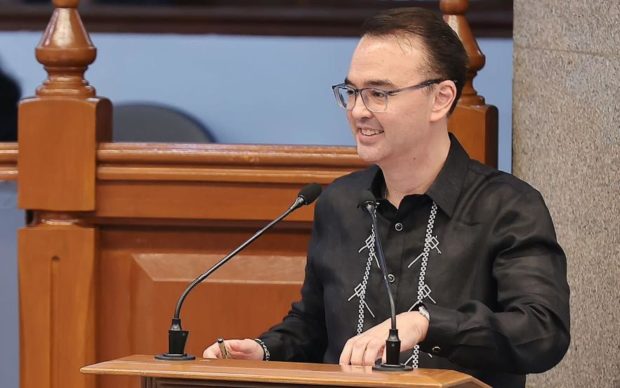MANILA, Philippines — Senator Alan Peter Cayetano on Saturday batted for an “equitable national budget” that will leave no Filipino behind and will address the needs of the people in the regions and provinces, saying investing in areas outside of the major urban centers will ultimately benefit the entire country.
“We need a national budget that leaves no Filipino behind. Walang iwanan dapat,” Cayetano said as the Senate and the House of Representatives begin the bicameral panel meetings that will reconcile their respective approved versions of the P5.268 trillion National Budget for 2023.
Noting that allocations have usually favored the National Capital Region (NCR) and other highly urbanized cities, the independent senator said the government “should make every effort to provide quality jobs all over the country and not just in Metro Manila, Cebu, Davao, and other urban centers. It’s time we replicate this growth in other regions.”
Cayetano, who had long advocated for the equitable of sharing of funds, services, infrastructure, and other government programs throughout the country, said all Filipinos “deserve the chance to live a full life no matter where they live.”
“Equity is an essential element of unity. Equity is fairness. It is social justice. It is the key in providing opportunity for all Filipinos to fulfill their potential not just for themselves but for the benefit of the entire nation. And there is no equity if Metro Manila and highly urbanized cities are the ones that are always favored,” he said.
A real choice
Cayetano said the government should make rural life “a real choice for a safe and comfortable life” for Filipinos by making sure every barangay in the country has electricity, water supply, internet connection, a good elementary and high school, and health centers.
Every province, he added, should have at least one good tertiary hospital, noting that the largest concentration of such facilities is in the National Capital Region (NCR) with around 60 while the regions are left with 5 each at the average.
“This means there are provinces where the people have to travel far to get good health services,” Cayetano said.
He noted that many Filipinos, taking advantage of the “Balik-Probinsya, Bagong Pag-asa” program of the previous administration at the height of the COVID-19 pandemic, went home to their respective hometowns to start a new life with their families.
“Marami sa kanila ang umasang may trabaho o ibang mapagkakakitaan sa kanilang pag-uwi. Let’s not disappoint them. Let’s instead reward their commitment by pouring in the necessary funds so that jobs can be created in the regions,” he said.
Cayetano said he believes many Filipinos will follow suit if they see the government seriously investing all over the country, especially in basics (water, electricity, internet connectivity, health, and education facilities) and furthermore in the areas of agriculture and infrastructure.
“Projects like irrigation, farm-to-market roads, bridges, and others like these will pump-prime quality jobs in rural areas,” he said.
A better life
Cayetano, who is one of the assigned members of the Senate Bicameral panel, said he will continue to bring this and other concerns to the bicam meetings.
Citing irrigation as an example, he said legislators should heed the request of the National Irrigation Administration (NIA) for a P50-billion budget instead of the approved P40.842 billion. “More irrigation means greater harvest, and greater harvest means better economy — and a better life — for the provinces,” he said.
While he hailed the increase in the budget for farm-to-market roads from P7.485 billion in 2022 to 13.14 billion in 2023, he said this is not enough especially when compared with the amounts the country’s Asian neighbors are allotting for such infrastructure.
Thailand, he said, has completed 47,916 kilometers of farm-to-market roads while Vietnam has done 175,000 kilometers — a far cry from the Philippines’ 2,712 kilometers.
“Kung bubuhusan natin ng pondo ang mga ganitong proyekto sa labas ng urban centers, lalago ang ekonomiya nila at makakapagbigay tayo ng trabaho sa mas maraming Pilipino,” he said.
Cayetano also said he believes distributing projects throughout the country will help ease congestion in the NCR and other urban centers. “If we want a long-term solution to decongest Metro Manila, the government must bring growth to the countryside,” he said.
Cayetano had previously said it would be beneficial to move the head offices of some government agencies to other regions where they can have more impact.
He said the Department of Agriculture (DA) and Department of Agrarian Reform (DAR) can be transferred to Central Luzon which is the country’s rice granary, the Department of Transportation (DOTr) to Cavite where the construction of a new international airport has just been approved, and the Department of Tourism (DOT) to Cebu which is a tourist haven.
“Metro Manila is the political and financial capital of the Philippines, but this should not mean economic activity should be concentrated in the National Capital Region,” Cayetano said.


